- Home
- Sherwood Smith
Banner of the Damned
Banner of the Damned Read online
Also by Sherwood Smith:
The History of Sartorias-deles
INDA
THE FOX
KING’S SHIELD
TREASON’S SHORE
BANNER OF THE DAMNED
The Dobrenica Series
CORONETS & STEEL
BLOOD SPIRITS
REVENANT EVE*
* Coming in Fall 2012 from DAW Books
Copyright © 2012 by Sherwood Smith.
All Rights Reserved.
Jacket Art by Matt Stawicki.
Book designed by Elizabeth Glover
ISBN: 978-1-101-57993-0
DAW Books Collector’s No. 1581.
DAW Books Inc. is distributed by Penguin Group (USA).
All characters in the book are fictitious.
Any resemblance to persons living or dead is strictly coincidental.
The scanning, uploading and distribution of this book via the Internet or any other means without the permission of the publisher is illegal, and punishable by law. Please purchase only authorized electronic editions, and do not participate in or encourage the electronic piracy of copyrighted materials. Your support of the author’s rights is appreciated.
First Printing, April 2012
1 2 3 4 5 6 7 8 9
PRINTED IN THE U.S.A.
for Hallie O’Donovan
ACKNOWLEDGMENTS
Thanks to:
Francesca Forrest, Pilgrimsoul, Beth Bernobich, Amanda Weinstein,
and especially to:
Kate Elliott, Hallie O’Donovan, and Rachel Manija Brown
for duty above and beyond.
Table of Contents
Part One: Court
One: Of the Scribes’ First Rule
Two: Of the Second Rule
Three: Of the Hierarchy of Style
Four: Of White Linen and Ignorance
Five: The Dangers of an Unguarded Smile
Six: Of Honeyflower Wine and Lily-Bread
Seven: Of the Price of Style
Eight: Of a Disinterested Impulse
Nine: Of Cats and Golden Cages
Ten: Of Sartor and Gargoyles
Eleven: Of Love and Power
Twelve: Of the Rafalle
Part Two: Love
One: Of Rumbles in the Distance
Two: Of Silver Coronets
Three: Of the Great Map
Four: Of Roses in Bloom
Five: Of Roses Undone
Six: Of Porcelain Shards
Seven: Of Spiced Wine
Eight: Of Royal Wagers
Nine: Of Water and Magic
Ten: Of Fire and Water
Eleven: Of Summer Thunder
Twelve: Of Horses in Flight
Part Three: Colend Goes to War
One: Of White Ribbons
Two: Of Veiled Plays
Three: Of Silver Trumpets
Four: Of Empty Hands
Five: Of a Black Coat
Six: Of a Lock of Hair
Seven: Of Royal Veils
Eight: Of the Risks of Shared Mirth
Nine: Of Images and Expectation
Ten: Of the World of Books
Eleven: Of Secrets and Empty Rooms
Part Four: Magic
One: Of Foresight and the Serving of Food
Two: Of Patterns Visible and Invisible
Three: Of an Act of War
Four: Of the Merciless Melody
Five: Of Rocks in the Sea
Six: Of the Patient Willow
Seven: Of Banners in the Wind
Eight: Of Isolated Vision
Nine: Of Secrets within Secrets
Ten: Of the Riding Moon
Eleven: Of Mercy
Part Five: The Fox Banner
One: Of Hymns and Beginnings
Two: Of the Snap of a Fan
Three: Of Regret and Remembered Bells
Four: Of Turned Cuffs and Moustaches
Five: Of Lightning Rutilant
Six: Of Secrets and Syncretics
Seven: Of the Adumbrations of Power
Eight: Of the Fox Banner Unfurling
Nine: Of Lasva-Gunvaer’s Ride
Ten: Of Renascence
Eleven: Of Sartor’s Shadow
Twelve: Of the Lineaments of Lace
Part Six: Glory
One: Of the Vagaries of Fame
Two: Of Memory’s Enchantment
Three: Of Cinnamon and Zathumbre
Four: Of a Notched Trunk
Five: Of Swords and the Absence of Cats
Six: Of Swords and the Presence of Cats
Seven: Of a Tapestry Sketch
Eight: Of Evil Mages
Nine: Of the Mutability of Time
Ten: Of a Witnessed Glance
Eleven: Of the Banner and Damnation
Twelve: Of my Surrender
The End
ONE
OF THE SCRIBES’ FIRST RULE
T
he scribes have three rules. First Rule: Do not interfere.
Second Rule: Keep The Peace.
Third Rule: Tell the truth as we see it.
I can see your ironic faces, those of my judges who know that I began life as a scribe. This, my defense testimony, shall show how I tried not to interfere, that I meant to keep The Peace; and I will reveal the means that enables me to tell the absolute truth.
I will begin with the first important day of my life, just before the Hour of Daybreak, the spring I turned fourteen.
While Princess Lasthavais Lirendi—known to everyone in Colend from queen to shepherd as Princess Lasva— danced happily off to bed after her triumphant introduction to court in the grand ballroom, I awoke in a different part of the royal palace: the attic chamber for kitchen servants.
It was still dark when the hand touched my arm. I lunged up, shocked awake, then remembered that I was not on bread duty. So who was this silhouette barely outlined against the high window?
“Emras. If you wish to be examined for your Fundamentals, present yourself at the Hour of the Sun at Golden Gate.” She was a scribe teacher!
Fundamentals! The test we scribe students called The Fifteen, as that was the customary age a student took it. But then I was the youngest in our class. Or had been before my exile to the kitchens half a year before.
I must not say the wrong thing. “Am I permitted a question?”
“Yes.”
“Do I wear my kitchen garb?”
“Do you test as a scribe or as a baker?”
The silhouette did not wait for my answer, but moved away in a rustle of fabric. One girl at the end of the row of beds mumbled in her sleep, turned over, and her breath slowed once again into slumber. The other girls slept on.
My hands trembled as I crouched at the foot of my bed and lifted the lid to my trunk. Quietly I set aside my books and writing implements, then lifted out the plain undyed linen robe we scribe students wear, which I had nearly burned half a year ago.
If I’d burned it, I would have had to wear my kitchen smock, and that would have been the first mark against me. The thought made me sick with anxiety as I raced down to the bath. There was so much they did not tell you, that you were supposed to know by reason or calculation or observation.
I splashed in and out of the bath and, still damp, flung the robe over my head, breathing deeply of linen and of the cedar wood trunk where my robe had lain for half a year. It no longer brushed the tops of my feet. I tugged, but it hadn’t caught anywhere on my scrawny body. I stared down in dismay at my bare ankles and my exposed feet like a pair of fans at partial unfurl. Not only was my robe too short, but the hem—the entire robe—was puckered in wrinkles. No help for it.
I dunked my servant’s tunic in the barrel. Magic
flashed over it, making it clean. I wrung it hard once or twice, then put it in the air-chamber next to our bath for it to dry, my longing never to touch it again so strong that I shivered. I had done good work in the kitchens—I’d even made friends—but oh, to feel paper and pen in my hands again instead of dough, to read instead of knead, to listen and talk about history and the world today instead of enduring long anecdotes about past banquets!
So hurry, I scolded myself.
My old slippers no longer fit. I put my feet in my kitchen shoes. I’d cut off my hair on a hot autumn day. It was still too short to braid, so I tied it back with my crumpled old scribe ribbon, and paused. For the first time in six months, I was a scribe again. That meant I could carry a scribe’s tools. I had not been instructed to, but the prospect of slipping my travel pen, screwed into its inkwell, and a small roll of paper into my tool pockets was too overwhelming a joy to resist. No one had to know they were there.
Then I ran.
Twice in the year, spring and autumn, the Hour of the Sun actually coincides with the sun’s appearance. The spring morning was already warm, the sky blue in the east as I gave wide berth to the royal residence portion of the palace and cut through the annexes and across the public gardens between wings. Why must we meet at Golden Gate? It had to be the farthest of the palace gates. Only the city gates were farther, I thought irritably as I pounded past the herb garden the courtiers were currently calling Isqua’s Assent for some typically obscure reason. I breathed in the fragrances as I leaped the low, vine-covered wall without bruising a single blossom. That would have angered the gardeners, who were beginning to appear in order to whisk away any withered flowers before the courtiers woke.
Down I ran the entire length of the Rose Walk, alongside the princess’s wing of the royal residence. I slowed when I spied the polished copper of the former palace’s twin bud domes glinting with ochre shading on the eastern curves, above the wild tangle of the old park.
There was the point of the inflexed arch of Golden Gate. I’d been given plenty of time, but I wanted to arrive early, to see who might be there and to discover what would happen when they saw me for the first time in half a year.
The others pressed in a cluster directly under the Golden Gate. Its wall was long gone, but no one wanted to be marked for error. The only thing scribe students knew about the Fifteen Test was that each year it was different.
Someone must have spoken for they turned as a group, their faces lit by the sun just rising behind me. Waves of shyness made my skin prickle and my mouth dry. My parents had taught my brother and me that scribes were unobtrusive. From the time I was four I’d earned a treat if I entered and left a room without sound, and a bigger treat if I managed to enter a room without being noticed.
Being stared at made me feel I had erred. But I had been ordered to be here, so I stared right back.
There was the oldest boy, tall Nashande, and a girl who must have been promoted to the royal scribe school while I’d been exiled to the kitchen. Already testing? She had to be smart. The urge to compete, to find a place above her, made me anxious again as they glanced at me with indifference. Scrawny Thumb, who for once was not blotched with drawing ink, didn’t even look. He was studying the mossy lily carvings on the gate.
Not indifferent was my cousin Tiflis, until six months ago my best friend and study partner. Secret sisters, we’d called one another. She, Sheris, and Faura stared at me with interest but no welcome.
I shifted my gaze before my burning eyes could disgrace me with tears, and movement distracted me. There was the boy we called Birdy, juggling again. I glanced at him in scorn and annoyance as he lurched and bobbled those ever-present little silken bags of sand, dropping one every couple of throws. In four years he’d not gotten much better. Birdy’s crescent eyes were set close on either side of his beaky nose. But the nickname came when he was ten from the way his rust brown curls stuck up in shocks and his ears stuck out like little wings, making him look like a startled bird. His hair was longer now, pulled back into a neat braid that swung as he twitched and sidled in a desperate attempt to keep the sandbags in the air. He looked more awkward then ever, bony and clumsy—he had to be every day of sixteen, I thought in disgust. Why did he still make such a fool of himself?
Birdy had been my toughest competitor in classes, calling me The Baby and smirking when I was wrong. I’d smirked right back at him, gloating when he was given deportment marks for that ridiculous juggling. Scribes were supposed to be quiet and unobtrusive. He then made remarks to his silken bags about nose-lifted ‘shadow-kissers’—our slang for fawning and flattery.
Old habit made me turn to my cousin for safety.
Tiflis met my eyes, looked away, cut a glance back, and our eyes met again. “You’re here, Em.”
For six months I hadn’t seen her. When my Name Day came and went unobserved by anyone except messages from my parents in Ranflar and from my older brother on another continent, I’d cried so hard that the senior cook took me aside and asked why I grieved.
So I told her. Her answer was, “Would you not have done the same, if your positions had been reversed?”
It took me a week to admit that Yes, I would have done the same, for fear that Tiflis’s disgrace would somehow pull me into disgrace.
I said to Tiflis, “I’m here.”
Then I took my place on the other side of Nashande, because I knew that even had I avoided Tiflis if she’d been sent away, when I saw her coming to rejoin the scribe world I would have run to meet her.
But she only said, You’re here.
The whispers ceased, and Birdy straightened up, his silk bags vanishing into his robe pocket. Just as the city bells pealed out the sweet cascade of chords signifying Sun Hour, toward us strode… none other than Scribe Halimas, the senior scribe, his pace vigorous enough to make his thin gray queue swing against his bony back, his bony knees poke the white linen robe, his cloud blue overrobe billow. He taught the elite, those who would become royal scribes, or maybe even herald scribes—the ones who decide what writings are kept in the archives.
We all straightened up, wondering why he was bothering with us.
“Let us not waste time.” He marched around the gate without slowing. “Now. Who will give me a concise history of the old palace? Three to five hundred words.”
I find I can still recite every question he asked, so full of portent and importance they seemed to me. Mostly about Sartoran history. Oh, the joy of questions whose answers you know!
But that, we discovered, was just the preliminary. Then came the questions no one could have studied for.
The first was when Scribe Halimas led us to the massive carved doors to the shell of the old palace and asked, “What do you see?” indicating the intricate carvings.
Four voices said, “The Treaty of Sovereignty.” Sheris, who shadow-kissed the adults (Tif and I had called her the Empress), declared with that self-important lilt that had always made my insides tighten, “They finished carving them in 3615.”
Faura, who shadow-kissed Sheris, put in, “Almost eight hundred years ago.” Then she flushed, when everyone but Sheris looked at her. What? Faura was always at Sheris’s side.
The class looked away as quickly. We were on our best behavior, the Second Rule of the Scribe Guild having been repeated by tutors, and by us, since we were very small: Scribes keep The Peace.
Scribe Halimas was famed for sarcasm, but he only flicked a glance at Faura, eyebrows slanting steep enough to furrow his forehead. Safely behind him, the young girl I didn’t know rounded her eyes in the Too Obvious to Be Interesting expression.

 Inda
Inda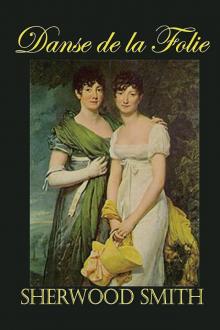 Danse De La Folie
Danse De La Folie King's Shield
King's Shield Whispered Magics
Whispered Magics Fleeing Peace
Fleeing Peace Barefoot Pirate
Barefoot Pirate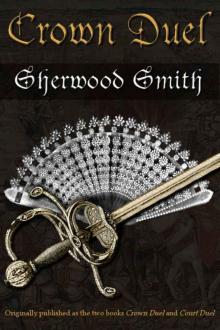 Crown Duel
Crown Duel Mearsies Heili Bounces Back
Mearsies Heili Bounces Back Commando Bats
Commando Bats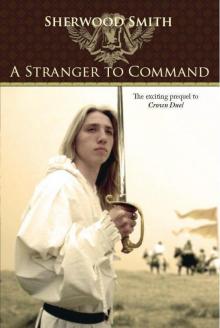 A Stranger to Command
A Stranger to Command Lhind the Spy
Lhind the Spy The Spy Princess
The Spy Princess Blood Spirits
Blood Spirits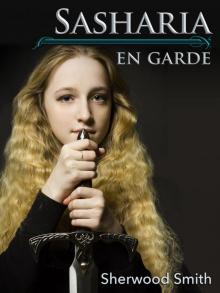 Sasharia en Garde
Sasharia en Garde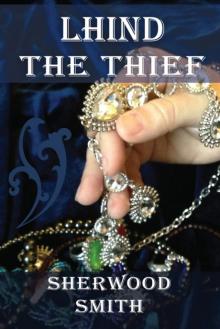 Lhind the Thief
Lhind the Thief Paradise Drift
Paradise Drift Banner of the Damned
Banner of the Damned The Trouble With Kings
The Trouble With Kings Poor World
Poor World Treason's Shore
Treason's Shore Wren Journeymage
Wren Journeymage A Posse of Princesses
A Posse of Princesses Revenant Eve
Revenant Eve Once a Princess
Once a Princess Time of Daughters I
Time of Daughters I Rondo Allegro
Rondo Allegro Coronets and Steel
Coronets and Steel Over the Sea
Over the Sea Senrid
Senrid Hunt Across Worlds
Hunt Across Worlds A Sword Named Truth
A Sword Named Truth The Fox
The Fox Twice a Prince
Twice a Prince Fair Winds and Homeward Sail: Sophy Croft's Story
Fair Winds and Homeward Sail: Sophy Croft's Story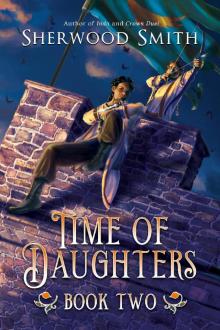 Time of Daughters II
Time of Daughters II The Rifter's Covenant
The Rifter's Covenant The Phoenix in Flight
The Phoenix in Flight Stranger
Stranger The Thrones of Kronos
The Thrones of Kronos A Prison Unsought
A Prison Unsought Twice a Prince: Sasharia En Garde Book 2
Twice a Prince: Sasharia En Garde Book 2